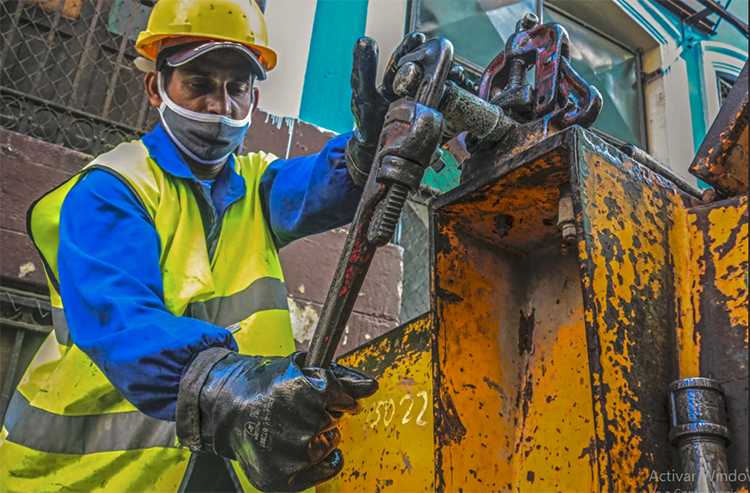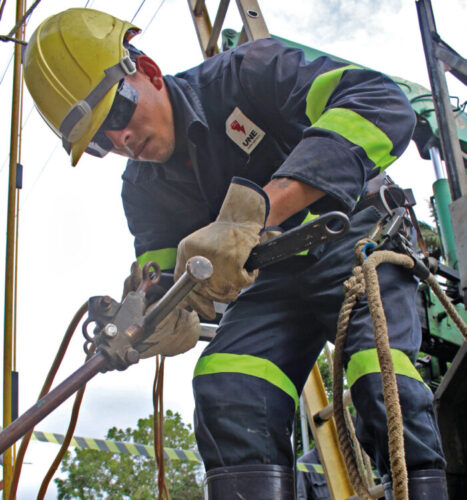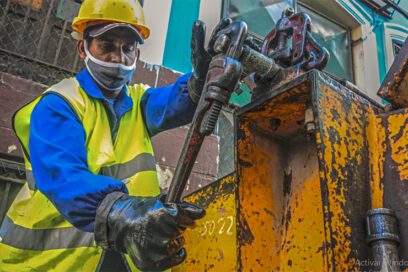Year after year, statistics show that indiscipline in the use of protective equipment can cost lives or cause irreversible injuries. The economic scenario of the country is complex. However, there is insufficient production and high demand for gloves, boots and any other equipment that can contribute to safety and health at work.

When we look at the issue, we see that there are differences between sectors, provinces and unions. All activities do not present the same risks; it is the responsibility of the administrations to guarantee the appropriate protection of their workers and, in turn, to ensure that they use the means of protection appropriately, with the active intervention of the trade union.
The Cuban government maintains the objective of guaranteeing the health of workers as part of the social policies to be carried out until the year 2030, linked to the Macro Program for Human Development, Equity and Social Justice, which establishes and regulates decent employment.
Healthy and Safe Environments?
Work accidents continue to increase in a significant number of primary and tertiary economic organizations. A recent analysis at the National Secretariat of the Central de Trabajadores de Cuba (CTC) revealed that the unions that stand out in this negative indicator are: Transportation, with 49 accidents at work and on the road; Sugar, with 43; Energy and Mining, with 40; Construction, with 36; Commerce, Gastronomy and Services, with 35; Agriculture, Forestry and Tobacco, with 17; and Defense Civilian, with 15.
The provinces with the highest accident rates at the end of December 2023 are Holguín, with 59, and Villa Clara, with 57.
The Ministry of Labor and Social Security (MTSS) reported that there have been 851 work accidents to date, of which 25 have been fatal.
Similarly, a CTC report that reviews the characteristics of the scenario at the end of the first quarter of this year explains that there were 14 deaths, with an average age ranging between 25 years, belonging to the sectors of commerce, gastronomy and services (4); defense civilian (7); sugar (2) and agriculture and livestock (1).
Yordanis Cruz Sánchez, CTC official in Holguín in charge of the Labor Department, pointed out that one of the most important functions in this area is to manage the constant improvement of working conditions in order to achieve a healthy and safe working environment.
On the other hand, there is a tendency to under-execute the corresponding budgets, even though the purchase of protective equipment has shown a positive trend in the last period, but the quality of this equipment and its use by workers remains an issue to be resolved.
The work to eliminate or minimize occupational hazards and their impact on accidents has not been without difficulties. The greatest needs, he emphasized, are concentrated in gloves (dielectric, heat, latex); goggles (impact, acid, particle); ear muffs; boots (sanitary, rubber, with caps); aprons (plastic, short PVC, long PVC) and helmets.
The main causes are the centralization of budgets in the provincial entities or the lack of monitoring and control of their execution, failures in administrative management, noncompliance with contracts between companies and agencies, and the lack of demand by union leaders for workers to be accountable to their member assemblies for the performance of the financing of the acquisition of such resources.
This panorama covers the whole of Cuba. The data obtained in the CTC of Villa Clara show that among the difficulties encountered with personal protective equipment in the province are the wrong selection, poor purchase management, high prices, constantly increasing by MSMEs, which are the main suppliers, delays by the supplier and the need for training.

Right on Target
At this point, it is not idle to point out that occupational safety and health is far from being just another task. Its priority is already recognized in article 69 of the Constitution of the Republic, which underlines the main lines of the subject for the State through the adoption of appropriate measures aimed at the prevention of accidents and occupational diseases.
Likewise, Law 116, the Labor Code, recognizes in Article 24 that occupational health and safety conditions must be agreed upon as part of the employment contract.
If we consider the series of deficiencies that surround this activity, it is contradictory to know that there are state and private organizations that are ready to produce a significant number of media because they have the necessary infrastructure and manpower.
Since the approval of MTSS Resolution No. 6, on April 6, 2022, there has been a slight increase in the national production of personal protective equipment (PPE), as the regulation includes new economic actors: micro, small and medium-sized enterprises (MSMEs), non-agricultural cooperatives (CNAs) and self-employed workers (TCPs), Valia Carbó, head of the PPE Registration and Approval Center at the aforementioned agency, told Trabajadores.
She explained that this participation depends on whether they meet the quality standard based on the required tests and trials. In the hierarchy of methods used to control workplace hazards, personal protection is essential in the presence of risks that cannot be prevented or sufficiently limited at source by technical, organizational or collective protection measures, so that the safety and health of workers are guaranteed by the use of PPE during certain activities.
Likewise, the expert assured that there are other reasons for the non-compliance in the execution of the budget, such as: the lack of supply in local currency and the entities do not have the financing in foreign currency necessary for the acquisition of essential PPE in some activities.
To this list must be added the fact that some of the means of protection are not produced in the country, the poor quality of some equipment, the increase in market prices, as well as the policy of import concentration applied by the Ministry of Foreign Trade and Foreign Investment, which makes it difficult to obtain the equipment that is essential for these activities and that involves very specific risks.
For Ángel San Martín Dupoté, head of the Occupational Health and Safety Department of MTSS, this function should focus on solving procedural, structural and maintenance problems within a company. A notable step in this direction, he highlighted, has been the analysis of the problem in the organizations that have the greatest impact on the accident rate.
Answers to a Big Problem
This research left other questions unanswered. The life and health of Cuban workers are important, and there are regulations, guidelines, budgets, institutions and specialists who must enforce what is established, without ignoring the individual responsibility of the worker.
What happens in the workplace with good and bad examples? What is the role of the trade union? What are the demands of the manufacturers of protective equipment and what is the situation with the inspectors of the National Labor Inspectorate? We will look for these and other answers. You, your family and the country need them.


